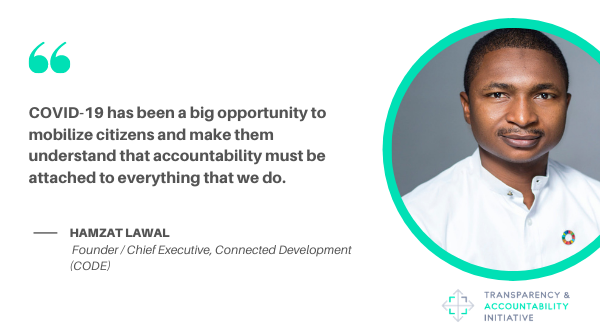Highlights
- Leadership deficits
- Online violence
- Artificial hero and villain
- #BlackLivesShattered (tax dimension)
- Mixed Signals
- Shape shifters
- TAI Spotlight: The role of funders in fostering fair and equitable partnership in global development
Leadership deficits

Image Credit: TeamWorkDefinition
“Democratic governance” seems to be one of the phrases of the moment, so we chose to start this week with a check in on the democracy side of things before our dive into all-things governance. Perhaps no surprise to see a nosedive in the quality of democracy enjoyed by average global citizens, according to the latest Democracy Report by The Varieties of Democracy Institute.
South Africa was a model democracy success in the 90s, but still struggles with deep-rooted inequalities today. Brian Levy, Alan Hirsch, Vinothan Naidoo, and Musa Nxele suggest three ways out: muddle through, endure a surge of ethno-populism, or pursue inclusive development.
What about modern-day political polarization? Jonathan Schlefer takes a sweeping look at how elite power struggles have been a destructive force in American democracy and argues for a bottom-up approach as a possible remedy.
What do we know about COVID-19 and leadership? Heather Marquette and Sian Herbert share political lessons from COVID. Their conclusion? “Global preparedness systems can be adapted to better predict where bad political decision-making may get in the way of effective responses in the future.” Essentially “we need better politics, not just better leaders, and we need this now.”
Speaking of leadership, a growing number of former world leaders are being investigated, prosecuted, and even jailed worldwide (from the US to France). In theory, this shows no one is above the law, but in practice, does such move strengthen the rule of law or polarize the society? Scholars at the University of Washington look at the effect of prosecuting past leaders on democracy and submit that: “overzealous political prosecution is more likely, and potentially more damaging, in emerging democracies where courts and other public institutions may be insufficiently independent from politics.”
Online violence
One pillar of effective democracy is a free press, but David Maas details new research on the ferocity of online violence against journalist Maria Ressa in the Philippines. The sexist, misogynistic, racist, and graphic nature of the attacks against Ressa show how incessant, targeted online abuse can create an environment that enables antidemocratic forces to crack down on journalists.
On a happier note, fact-checkers are teaming up with social media influencers in Nigeria to combat misinformation – especially around vaccines and the pandemic, while the “Good Lobby Profs” are seeking to mobilize academic experience to counter major rule of law violations, and abuse of power within and across Europe.
Artificial hero and villain

Last week we covered a lot on environmental, social and governance (ESG) trends and disclosures. In a build on those developments, Gillian Tett highlights the importance of digital transparency to end greenwashing.
Mona Sloane warns of an algorithmic auditing trap unless we improve the practice of algorithmic “bias audits,” which can themselves get hijacked. She welcomes moves to algorithmic transparency as in the Helsinki and Amsterdam but worries the positive effects are hampered by a lack of clear definitions for “algorithm,” “automated decision-making tool,” and “A.I.”
Talking of city led efforts to manage digital tools, Tom Asher, Hollie Russon Gilman and Abigail Andreson reflect on their use for responsible governance in New York through their civic engagement commission and some of the pitfalls along the way.
TPA Full Disclosure Series: Hamzat Lawal on bringing citizens closer to policy and decision making

Hamzat Lawal’s passion for grassroots advocacy began during his Boy Scout days in Abuja, Nigeria, where he would go from door-to-door to educate his community on the importance of environmental cleanups. So far, he has led grassroots campaigns in over eight African countries – including Nigeria. As the Chief Executive of Connected Development (CODE), Hamzat leads a team of technology and innovation-driven campaigners to amplify marginalized communities’ voices in promoting accountability as it affects public funds utilization. Follow the Money; the pan-African grassroots data-driven movement Hamzat founded saved the Nigerian government N50billion ($131million) in 2019 alone. We sat down with Hamzat to talk about his anti-corruption efforts in Nigeria and across Africa and to hear early lessons from dealing with COVID-19 and accountability in health responses and economic relief.
#BlackLivesShattered (tax dimension)
Dara Latinwo highlights how tax havens and illicit financial flows have held back African development in decades since gaining independence. Pushing for progress includes prioritizing making taxes work for women in Africa, where fiscal policies should recognize and reduce unpaid care work. Just don’t look to the US for inspiration – Dorothy Brown’s investigation into America’s tax code finds that a tax code optimized for White wealth has left Black Americans behind.
Developing economies in Southeast Asia can benefit from tax reform by expanding the tax base and maximizing tax compliance. Further north, the Mongolian Tax Administration has built its capacity to carry out tax audits in the mining sector while issuing its first transfer pricing tax assessment for roughly $228 million.
Is the global tax environment entering a new wave of transparency? Recent report shows increasing political momentum around public country by country reporting on taxes while the UN Tax Committee works to strengthen UN’s role on global tax. The UN General Assembly Special Session on corruption in June 2021 has the opportunity to establish a global standard on beneficial ownership, as evidenced by over 700 signatories to Transparency International’s petition. More incentive might come from new research showing that fiscal transparency helps attract foreign direct investment.
Zurich private bank Rahn+Bodmer pays $22 million to settle U.S. criminal charges that it helped American taxpayers hide hundreds of millions of dollars in offshore accounts.
US Treasury Secretary Janet Yellen met with Jubilee USA Network regarding a variety of issues including debt, transparency, and tax proposals to prevent future crises, while US Senator Bernie Sanders has introduced a bill to tax companies with excessive CEO pay.
Mixed signals

The UK integrated review of security and development urges restoring commitment to international development and includes a proposal for a new global sanctions regime on corruption, yet reports of severe cuts to international anti-corruption and human rights work send a contrasting message.
Meanwhile, the Biden Administration signals it wants a much stronger line on fighting corruption, not least as a national security issue, while Walter Schaub calls for more urgent progress on the domestic front to push ethics and anti-corruption reforms.
Time we rethink corruption reform for more scale and substance? Gerhard Anders highlight learnings from Malawi’s Cashgate. Check out the accompanying policy brief for key recommendations and insights. Jackie Harvey examines the Financial Action Task Force anti-money laundering framework as applied in Nigeria and offers recommendations to improve transparency and identify beneficial ownership. The Centre for Democracy and Development says monitoring and evaluation is vital in tracking the fight against corruption in the country.
In South Africa, public anger over corrupt government contracts for COVID-19 supplies may finally inspire action and force the government to take more decisive steps against corruption. Pair with lessons from Ecuardor’s procurement response to Covid-19 and this paper that provides a fresh approach to assist politicians, leaders, and managers in adopting better strategies to reduce corruption. Renzo Falla weighs in on how open government and open contracting can help achieve effective, efficient, and equitable delivery of vaccine procurement and delivery.
Listen to Global Integrity Anti-Corruption Evidence program researchers Amrita Dhillon and Jackie Klopp talk on the exacerbation of corruption due to the pandemic and how it is making things worse for migrants and small-scale traders in India and Kenya. For their part, Integrity Action has new research into sustaining impact of citizen-centered accountability.
Oh, and don’t miss this timely reminder from Yuen Yuen Ang on the need to unbundle corruption, recognizing limits of indices, and how they can skew against developing countries.
Shape shifters
With so much talk of localization in development writ large, no doubt that international CSOs are under pressure to adapt, exacerbated now by financial duress from operating amid the pandemic. Tosca Bruno-van Vijfeijken and Barney Tallack identify and share models of transformative practice in adjusting international roles.
Those adaptations require sensitivity and likely flexibility on the part of funders, too, including potentially looking at how to help groups develop alternative revenue streams, including earned income. Read what that can look like for legal empowerment organizations.
Chloe Cockburn of Open Philanthropy and the Just Impact Fund advises how philanthropic funds can help build reform movements drawing on the example of justice reform, while the Equitable Grantmaking Continuum pushes funders to take a hard look at how equitable their funding practices and offer a ready to use self-assessment framework.
Other Stories
- The case for accessible audit data: Tracking the effectiveness of Indian Governance Schemes
- Targeted online: How big tech’s business model sells your deepest secrets for profit
- China’s ‘sharp eyes’ program aims to surveil 100% of public space
- Corruption in fisheries: Transparency to the rescue?
- Global Insights: Transnational Kleptocracy and Covid-19
Featured call: Help us advance the use of extractives data in Colombia!
Attention Colombia-based organizations working on accountability and/or participation in the mining sector! Please submit your ideas by March 31 to advance the use of extractives data on: mining royalties, gender inclusion, ethnic community participation, and/or the response and recovery to COVID-19.
TAI Spotlight: The role of funders in fostering fair and equitable partnership in global development
The role of funders in fostering fair and equitable partnerships in global development | Hewlett Foundation
Program Officer with the Foundation’s Global Development and Population team, Joseph Asunka reflects on the role of funders in fostering equitable partnerships in global development and shares practical tips and lessons on what he has done to #ShiftThePower between well-resourced NGOs and their local partners
Strengthening audit for the benefit of stakeholders, the environment, and society | Luminate
Financial Transparency Director, Andrew Clarke shares Luminate’s recent effort on audit reform – why it matters and what they are doing to improve it.
Only a systems change approach can repair the broken systems | Chandler Foundation
Chandler Foundation CEO, Tim Hanstad and Anna Korzeniewska (Founder of Social Impact Alliance for Central & Eastern Europe) advocates for systemic solutions to alleviate and prevent complex issues.
Open Society Foundations call for immediate release of staff member in Myanmar | Open Society Foundations
Worrying news on arrest of Open Societies Myanmar staff member, Phyu Pa Pa Thuw, by the mlitary regime. OSF has demanded the release of their staff and asked the military junta to drop its baseless and false claims against other staff. Meanwhile, garment workers in Myanmar and others are staging general strikes and urging major international brands to denounce the recent military coup.
Business Secretary launches major overhaul of UK’s audit regime in wake of big-name company collapses | UK Government
While not specific to the Foreign Commonwealth and Development Office (FCDO), interesting to note that the UK government is launching a consultation on wide-ranging reforms to modernise the country’s audit and corporate governance regime that will have implications for FCDO goals on integrity of the global financial system.
Job Listings
- Senior Policy Advisor for Civic Space at Oxfam America – Ongoing
- Job postings at Hewlett Foundation – Ongoing
- Job postings at MacArthur Foundation – Ongoing
- Job postings at Open Society Foundations – Ongoing
- Job postings at Luminate – Ongoing
Job postings at Ford Foundation – Ongoing
Calls/Opportunities
- USAID Funding: Supporting transparency and accountability in Sudan – April 12, 2021
- West Africa Civil Society Institute (WACSI) call for papers and articles – Open year-round
- USAID’s Development Innovation Ventures (DIV) grant funding – Ongoing
- Call for research proposals Tax and civil society – No Deadline
- Free Digital Security Training – Ongoing
- Call for proposals: Informality, tax, and the state – Proposals accepted on a rolling basis
Calendar
- World Bank civil society policy forum (virtual) – March 22-April 11, 2021
- 2021 OECD Anti-Corruption & Integrity Forum (virtual) – March 22-24, 2021
- GI-ACE | Mainstreaming gender in anti-corruption research – Mar 23, 2021 10:00 AM (ET)
- Does Structure Rob Agency: Gender Mainstreaming in Anti-Corruption Research Design? –March 23, 2021 (10:00 EST)
- Financial Patterns and International Architectures: Grand corruption, Nigeria and the Role of the West – March 24, 2021 (11:00 EST)
- How social sector organizations can design human connections in the digital age – March 24, 2021 (11 a.m.-12:30 p.m. PT / 2-3:30 p.m. ET)
- What are the key tools and approaches to build infrastructure back better? – March 25, 2021 (2-3.30pm GMT)
- Virtual convening of Frontiers of Social Innovation: “People, Power, Resources: Enacting an Equitable Future” – May 11-13, 2021
- Monitoring Covid Relief Spending in the US – March 25, 2021 (10am, EST)
- Harnessing the intangible: Enhancing integrity during crises: integrity, social norms and informal practices in emergency response situations the governance of corruption – March 25, 2021 (01:00 PM in Paris)
- COVID & Corruption: Impacts and Lessons for Small Scale Cross-Border Traders – March 25, 2021 (9:00 EST)
- A Disruptive Fridays series session: Global Fallout: Covid-19 in Africa, Latin America & Beyond – March 26, 2020 (12PM EST)
- Frontiers of Social Innovation – May 11-13, 2021
- Open Gov week (Virtual) – May 17-21, 2021


